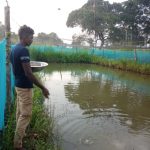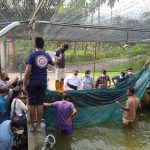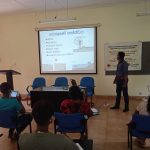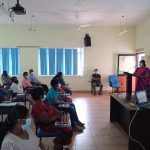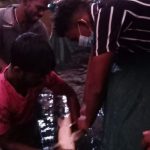“Fish” contribute significantly to the protein intake of the people of Sri Lanka with 70 percent of the annual protein consumption being derived from fish. According to the statistics, Freshwater fishery contributes about 20% of the total fish production of the country. Aquaculture in Sri Lanka is based on pond fish culture and seasonal village tank culture. By realizing the importance of fish farming in backyard ponds, under the project “Addressing causes for poverty and ensuring food security for Farming Communities” in Sri Lanka; Caritas Sri Lanka –SEDEC, Sustainable Agriculture & Food Security Unit organized a two-day training on pond fish culture at National Inland Fisheries and Aquaculture Training Institute (NIFATI) which is the premier government sector training institute in Sri Lanka, for inland fisheries and aquaculture. It is situated in Kalawewa in the district of Anuradhapura.
There was 25 Diocesan food security staff from Anuradhapura, Kurunegala, and Chilaw Dioceses, and selected lead farmers attended this training in the view of enhancing their awareness of the pond fish culture. Few of them have stocked fingerlings into the excavated ponds and others were expecting to engage with backyard pond fish farming with introduced fish species.
The outline of this training consisted of the following sub-topics conducted by Mr. M.D.M Senevirathna and a trained team of experts specialized in different fields of inland fisheries and aquaculture.
- Identification of fish spices and life cycle of fish
- Different types of aquaculture methods
- Fish breeding and broodstock management
- Fish breeding inspection
- Fish feed and feed processing
- Fish diseases and treatments
- Fingerlings Counting and packing
Mr. Pasindu Kaumila Chandrasekara, a young farmer from Thalawa, Anuradhapura is one of the participants of the program who was involved in backyard pond fish farming at present. According to him, it was possible to enhance his knowledge with all the relevant aspects of this field in the course of this training. Further, he shared that her mother is a member of Waragoda Govi Kantha community-Based Organization of Caritas Anuradhapura and the family members are engaged in home gardening. He is anticipating developing the fish pond to a source of nutrition for their family and a source of income generation with the knowledge and skills acquired from this training.
Among all the dioceses who participated, there is a better ecological potential for pond fish farming in the Anuradhapura, Kurunegala, and Puttalam district of Chilaw dioceses. Pertaining to the objectives of the Food Security project Caritas Sri Lanka – SEDEC is glad to note that this two-day program provided the platform to enhance the awareness on technical expertise on best aquaculture practices to the establishment to the maintenance of the freshwater fish pond in their home gardens will ensure their family nutrition and create additional support to their family income. This two-day training program was facilitated by Rev. Fr. Bennette Mellawa the Diocesan Director and Food Security team of Caritas Anuradhapura. At the end of the program, Very Rev. Fr. Piyal Janaka Fernando inspired the participants to engage in this activity to enhance family food security and nutrition.


